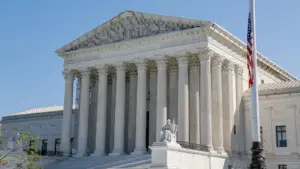A Supreme Court case regarding publicly funded religious charter schools, initiated by Oklahoma's St. Isidore of Seville Catholic Virtual School, may reshape U.S. education. While opponents argue it violates the Constitution, proponents see it as a chance to affirm parental choice and religious inclusion in education—an outcome influenced by Trump's judicial legacy.
A Landmark Case: How Trump's Supreme Court Is Reshaping Religious Education in America

A Landmark Case: How Trump's Supreme Court Is Reshaping Religious Education in America
The potential approval of religious charter schools could transform the educational landscape, stemming from President Trump's Supreme Court appointments.
A quiet revolution in education may be on the horizon, primarily due to the influence of former President Donald Trump’s appointments to the U.S. Supreme Court. The legal battle at hand revolves around a case that could pave the way for publicly funded religious charter schools, potentially challenging the long-standing government control over secular education. The dispute, brought forth by officials in Oklahoma on behalf of the St. Isidore of Seville Catholic Virtual School, positions the state against a group of activist organizations and federal officials aligned with President Biden, who argue that public funding for a religious school breaches constitutional boundaries.
For conservatives and advocates of religious freedom, this legal challenge marks a significant moment, hailing from Trump's influence on the Court through his three appointments. Legal experts remark that under previous court configurations, the case might never have reached this level; however, with a 6–3 constitutionalist majority now in place, the Court shows an openness to reconsidering older legal interpretations that have historically prevented faith-based institutions from receiving equitable treatment within the public education sphere.
St. Isidore operates as a fully online Catholic charter school, committed to instilling a values-based education while adhering to all academic standards required for Oklahoma charter schools. The Oklahoma virtual charter board approved its application in 2023 under Republican Governor Kevin Stitt, yet it has faced immediate legal challenges aimed at halting its operations. Opponents, who are supported by progressive legal factions, contend that allowing a religious institution to utilize public education funds constitutes an "establishment of religion." Nonetheless, recent Supreme Court rulings, particularly the pivotal Espinoza v. Montana Department of Revenue (2020), asserted that states cannot discriminate against religious schools solely based on their religious status.
The justices appointed by Trump—Gorsuch, Kavanaugh, and Barrett—were instrumental in that ruling and are anticipated to again play a crucial role in this new case. Legal analysts believe the Court might seize this opportunity to underscore that religious schools have the same rights to participate in charter programs, especially when enrollment is entirely voluntary and academic standards are fulfilled.
Conservative lawmakers are already heralding this case as a potential milestone in education reform. Representative Mark Green (R-TN) has expressed that, “For decades, our education system has excluded faith from the classroom under the false guise of neutrality. This case could finally restore parental choice and bring fairness back into the system.”
Counteracting this movement, the Biden administration has covertly voiced opposition, advocating for the preservation of strict separations between public funds and religious entities. Nonetheless, grassroots demand for religious charter schools continues to rise, notably among minority families who often feel marginalized by a failing public education system and are seeking solutions that resonate with moral values.
Trump has consistently advocated for school choice and religious freedom as essential rights, and the potential ruling from this case could be one of his most impactful cultural legacies, facilitating a reintegration of faith into American education and empowering families to align their children’s schooling with their core values.




















